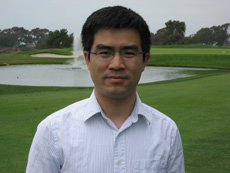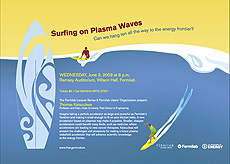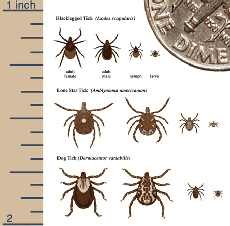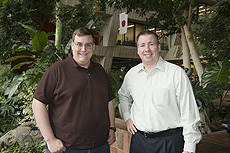|
Have a safe day!
Monday, June 1
2:30 p.m.
Particle Astrophysics Seminar - One North
Speaker: Dan Hooper, Fermilab
Title: Did Dark Matter Annihilations Reionize The Universe?
3:30 p.m.
DIRECTOR'S COFFEE BREAK - 2nd Flr X-Over
4 p.m.
All Experimenters' Meeting - Curia II
Special Topics: CMS/LHC Report;
First Tracks in ArgoNeuT
Tuesday, June 2
12 p.m.
Summer Lecture Series - Curia II
Speaker: Pier Oddone, Fermilab
Title: Future of Fermilab
THERE WILL BE NO ACCELERATOR PHYSICS AND TECHNOLOGY
SEMINAR TODAY
Click here for NALCAL,
a weekly calendar with links to additional information.
|
|
Monday, June 1
- Italian minestroni
- Patty melt
- Baked chicken enchiladas
- Herbed pot roast
- Chicken melt
- Assorted sliced pizza
- Szechwan green bean w/chicken
Wilson Hall Cafe Menu |
|
Wednesday, June 3
Lunch
- Spicy sausage & cheese calzone
- Cabbage & mixed green salad w/ tangy herb vinaigrette
- Chocolate chiffon cake
Thursday, June 4
Dinner
- Spinach phyllo roll-ups
- Grilled swordfish
- Ginger sesame jasmine rice
- Steamed asparagus
- Orange cream cheesecake
Chez Leon Menu
Call x3524 to make your reservation. |
|
|
Junjie Zhu wins Tollestrup Award

Junjie Zhu
When Junjie Zhu started analyzing W bosons at DZero, the precision W mass measurement was a distant goal.
But seven years later, the DZero collaboration has a preliminary result for the world's most precise measurement of the W boson mass at a single experiment, and Zhu will receive the Tollestrup Award for his work on the collaboration's analysis at this year's Users' Meeting.
Combined with other measurements, the reduced uncertainty of the W boson mass will lead to stricter Higgs boson mass constraints.
"It has been a long journey," Zhu said. "The W boson mass measurement is very difficult. It depends on the calorimeter calibrations-how well we understand our detector. Many people spent years working to make this possible."
Zhu contributed to that work by understanding the detector's ability, writing interface code so experimentalists and theorists could understand each other's analyses, writing prediction software and currently participating in writing the result paper.
"Dr. Zhu made numerous contributions to this very difficult measurement of one of the most important Standard Model parameters," said John Conway, 2009 chair of the Tollestrup Award Committee.
Alvin Tollestrup, namesake of the award given for outstanding postdoctoral research, will present Zhu with the honor at 4:15 p.m. Wednesday June 3, in Ramsey Auditorium.
Zhu will receive a certificate of recognition and a check for $3,500 from URA.
"Obtaining W mass measurement with world's best precision required many years of effort by the collaboration to build, operate and understand the detectors and simulation, said DZero co-spokesperson Dmitri Denisov. "Junjie demonstrated deep understanding of the experimental challenges, an ability to generate and implement ideas and he worked very hard in close cooperation with his colleagues from all over the world."
Zhu, a postdoc from SUNY Stony Brook University, has worked at Fermilab since 2002 and focuses on electroweak measurements, mainly involving the W and Z bosons.
--Tona Kunz
|
Annual Users' Meeting begins Wednesday
This year's annual Users' Meeting will feature recent experiment results, the laboratory's future plans and physics updates from Washington D.C. and around the world. The meeting, which will take place Wednesday, June 3, and Thursday, June 4, will provide Fermilab employees and users a chance to learn more about global physics projects and plans for experiments at Fermilab. Register now for the meeting.
More information
|
Dr. Akihiko 'Aki' Yokosawa, 1927-2009: Nuclear physicist at Argonne National Laboratory
From Chicago Tribune, May 29, 2009
Born into a centuries-old prominent samurai family in Japan, Dr. Akihiko "Aki" Yokosawa showed an early brilliance in science, loved ones say.
After completing college in Japan, Dr. Yokosawa enrolled at Ohio State University in 1950 and later earned a doctorate in physics. Soon after, he accepted an invitation to become a member of Sigma Xi, an elite scientific research society that honors excellence in scientific investigation.
Dr. Yokosawa, 81, died Monday, May 25, in his Naperville home after receiving a diagnosis of pancreatic cancer three weeks ago.
Read more
Read the obituary in the Sun-Times News Group papers.
|
"Surfing on Plasma Waves" lecture Wednesday at 8 p.m.

Tom Katsouleas, professor and dean, at Duke University's Pratt School of Engineering, will give a public lecture on Wednesday, June 3, titled "Surfing on Plasma Waves: Can We Hang 10 All the Way to the Energy Frontier?" The lecture will take place at at 8 p.m. in Ramsey Auditorium. Katsouleas will discuss next-generation particle acceleration using plasma waves in energy-frontier machines and the technology's industrial applications. Tickets for the public lecture are $5 and are available on a first-come, first-served basis.
|
Theorists reveal path to true muonium
From SLAC National Accelerator Laboratory press release, May 29, 2009
True muonium, a long-theorized but never-seen atom, might be observed in future experiments, thanks to recent theoretical work by researchers at the Department of Energy's SLAC National Accelerator Laboratory and Arizona State University. True muonium was first theorized more than 50 years ago, but until now no one had uncovered an unambiguous method by which it could be created and observed.
"We don't usually work in this area, but one day we were idly talking about how experimentalists could create exotic states of matter," said SLAC theorist Stanley Brodsky, who worked with Arizona State's Richard Lebed on the result. "As our conversation progressed, we realized 'Gee.we just figured out how to make true muonium.'"
Read more
|
|
|
Summer weather brings summer pests

Species of ticks. Image courtesy of the CDC.
The hot sun, cool breezes and lazy summer days entice people to spend time in the great outdoors. But whether you're camping, hiking or just walking the dog, be careful of some perennially troublesome summer pests: poison ivy, ticks, insects, and gypsy moths.
Poison ivy
Poison ivy can transform a pleasant walk into an unpleasant, itchy experience. The plant secretes oil that produces an allergic skin reaction in most people. Learn to recognize and avoid poison ivy. If you have been exposed, wash off the oil with warm soap and water. If you develop a rash, use hot compresses, calamine lotion or antihistamine creams to control the itch. Avoid scratching to prevent infection.
Ticks
Ticks are most active in early summer. They can spread diseases, such as Rocky Mountain spotted fever and Lyme disease, which have been on the increase in Illinois.
Due to the seriousness of these diseases, you should avoid ticks by wearing protective clothing (long pants and sleeves), using DEET repellents judiciously. You should also check your body thoroughly to spot ticks.
Other insects
Bees, wasps, mosquitoes, ants, spiders and flies - the list of bothersome insects (although spiders are not really insects) is a long one. Bees and wasps sting to defend themselves or their nests; ants (and rarely spiders) bite for the same reason. Mosquitoes need to steal a little bit of your blood to raise their offspring. Some people have severe allergic reactions to bee or wasp stings, and the rare spider bite can be painful and difficult to treat. Mosquitoes are notorious disease vectors, spreading malaria, yellow fever and west Nile virus among hosts. Avoid bees and wasps, ant hills, and likely hiding spots for spiders. Defend against mosquito bites by wearing long sleeves and pants, avoiding strong perfumes and using DEET repellent.
Gypsy moths
Gypsy moths, while not a threat to personal health or safety, are an ecological pest. They were introduced to this country more than 100 years ago and have thrived without the natural enemies they had in Europe. Local outbreaks result in nearly complete defoliation of heavily infested trees, especially oaks, early in the summer. Fortunately, most trees survive and have sufficient time to re-grow leaves by the end of summer. It is important to make sure you do not transport Gypsy moth eggs on firewood, nursery stock or recreation vehicles that have been in areas known to have infestations.
-- Rod Walton, ecologist
|
New employees

Michel Wren, AD Operations Department, and Timothy Currie, CD, began work on April 27.
|
|